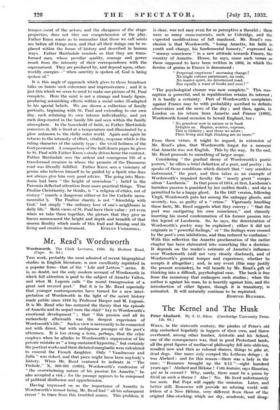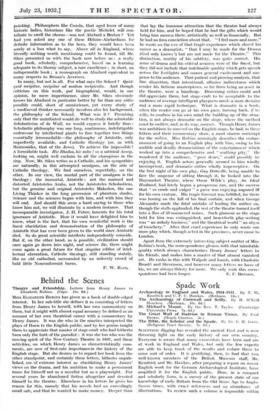The Kernel and The Husk
WHEN, in the sixteenth century, the pirates of Peter's old ship embarked hopefully in luggers of their own, and threw overboard, among other lumber, Aristotle and his School, one of the consequences was, that in good Protestant lands, all the great figures of mediaeval philosophy fell into oblivion, recalled now and then as colossal dunces, things to gibe at, dead dogs. One name only escaped the Lethean deluge : it was Abelard : and for this reason—there was a lady in the ease; "Romance brought up the 9.15 "—eight hundred years ago ! Abelard and Heloise ! Celle histoire, says Haureau, gui tie la retinal!? Why, surely, there must be a poem by Ovid on such a theme ? Alas ! No. He lived unfortunately too soon. But Pope will supply the omission. Later, and better still, Rousseau will provide an adoring world with letters of a New Heloise, very different from those of the original blue-stocking, which are dry, academic, and disap- pointing. Philosophers like Cousin, that aged lover of many historic ladies, historians like the poetic Michelet will con- tribute to swell the chorus—was not Abelard a Breton ? Yet had you asked any one of these Heloise-Abelarclians for definite information as to the hero, they would have been sorely at a loss what to say. Above all in England, where literally nothing worth mentioning could be found, till Mr. Sikes presented us with the book now before us : a really good book, scholarly, comprehensive, based on a learning adequate to its thorny subject, a rare excellence ; in short, an indispensable book ; a monograph on Abailard equivalent in many respects to Henna's Averroes.
In many, but not in all. For what says the School ? Quid- quid recipilur, recipitur ad rnodum recipientis. And though criticism on this work, qua biographical, would, in our opinion, be mere impertinence, since Mr. Sikes obviously knows his Abailard in particular better by far than any critic- possibly could, short of omniscience, yet every study of a mediaeval thinker necessarily involves also his background, the philosophy of the School. What was it ? Premising only that the uninitiated would do well to study the admirable Scholasticism of de Wulf, we would express it briefly, thus : Scholastic philosophy was one long, continuous, indefatigable endeavour by intellectual giants to fuse together two things essentially irreconcilable—the philosophy of Aristotle, only imperfectly available, and Catholic theology (or, as with Maimonides, that of the Jews). To achieve the impossible ! A formidable task. Hic Rhodus, hic salta ! so a satirical Aesop, looking on, might well exclaim to all the champions in the ring. Now, Mr. Sikes writes as a Catholic, and his sympathies are naturally, in this attempted amalgam, on the side of Catholic theology. We find ourselves, regretfully, on the other. In our view, the mortal part of the amalgam is the theology ; the immortal, Aristotle : not the maimed and distorted Aristoteles Arabs, not the Aristoteles Scholasticus, but the genuine and original Aristoteles Makedon, the one Living Thinker in the long procession of phantom shades. Science and the sciences began with him, and with him they will end. And should this seem a hard saying to those who know him not, we will illustrate by a modern instance. That incomparable investigator, J. H. Fabre, laments for his total ignorance of Aristotle. How it would have delighted him to know, what is the fact, that his own wonderful work is the finest elucidation and demonstration of the philosophy of Aristotle that has ever been given to the world since Aristotle died. So do great scientific intellects independently coincide. But if, on the other hand, as is possible, civilization should once again go down into night, and science die, there might come again a great future for that singular edifice of intel- lectual aberration, Catholic theology, still standing stately, like an old cathedral, surrounded by an unlovely crowd of bald little Nonconformist barns.
F. W. BAIN.















































 Previous page
Previous page